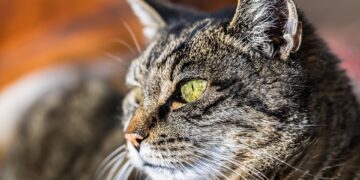The Purrfect Transformation: Understanding Your Cat’s Behavior Change After Vaccination
Introduction
As a responsible pet owner, ensuring your cat is up-to-date on their vaccinations is crucial for their health and well-being. However, many pet owners may notice a change in their cat’s behavior after receiving a vaccination. In this article, we will explore the reasons behind this behavior change and provide tips on how to help your cat through this transition.
Why Does Your Cat’s Behavior Change After Vaccination?
After receiving a vaccination, it is not uncommon for cats to exhibit changes in their behavior. This can be due to a variety of factors, including the stress of the vet visit, the physical effects of the vaccine itself, or a combination of both.
One common reason for behavior changes after vaccination is the stress and anxiety that can accompany a trip to the vet. Cats are known for being sensitive creatures, and the unfamiliar sights, sounds, and smells of the veterinary clinic can be overwhelming for them. This stress can manifest in a variety of ways, including changes in appetite, hiding behavior, or increased vocalization.
In addition to the stress of the vet visit, the physical effects of the vaccine itself can also contribute to changes in behavior. Some cats may experience mild side effects such as soreness at the injection site, lethargy, or a slight fever. These physical symptoms can cause discomfort and may lead to changes in behavior as your cat tries to cope with these new sensations.
Common Behavior Changes to Look Out For
While every cat is unique and may react differently to vaccinations, there are some common behavior changes to look out for after your cat has received a vaccine. These may include:
- Decreased appetite
- Lethargy
- Hiding behavior
- Increased vocalization
- Aggression or irritability
If you notice any of these behavior changes in your cat after their vaccination, it is important to monitor them closely and provide them with comfort and support during this time.
How to Help Your Cat Through This Transition
While it can be distressing to see your cat exhibit behavior changes after vaccination, there are several ways you can help them through this transition:
- Provide a quiet and comfortable space for your cat to rest and recuperate.
- Offer plenty of fresh water and nutritious food to help support their immune system.
- Engage in gentle play or cuddle sessions to help reassure and comfort your cat.
- Monitor their behavior closely and contact your veterinarian if you have any concerns.
By providing your cat with the care and attention they need during this time, you can help them feel more comfortable and secure as they recover from their vaccination.
Common Questions About Cat Behavior Changes After Vaccination
1. How long do behavior changes typically last after vaccination?
Behavior changes after vaccination are usually temporary and should resolve within a few days to a week. If your cat’s behavior changes persist or worsen, it is important to contact your veterinarian for further guidance.
2. Should I be concerned if my cat is not eating after vaccination?
It is not uncommon for cats to have a decreased appetite after receiving a vaccination. However, if your cat is not eating for more than 24 hours or if they are showing other signs of illness, such as vomiting or diarrhea, it is important to contact your veterinarian for advice.
3. Can I give my cat any medications to help with their behavior changes after vaccination?
It is important to consult with your veterinarian before giving your cat any medications to help with their behavior changes after vaccination. Your veterinarian can provide guidance on the best course of action based on your cat’s individual needs.
Conclusion
Understanding your cat’s behavior changes after vaccination can help you provide the care and support they need during this time. By monitoring their behavior closely, providing comfort and reassurance, and consulting with your veterinarian if necessary, you can help your cat through this transition and ensure they stay happy and healthy.
Remember, every cat is unique, and it is important to be patient and understanding as your cat adjusts to the effects of their vaccination. With the right care and attention, your cat will be back to their happy and playful self in no time.
By staying informed and proactive, you can help ensure that your cat’s vaccination experience is as smooth and stress-free as possible, allowing them to stay healthy and happy for years to come.














































